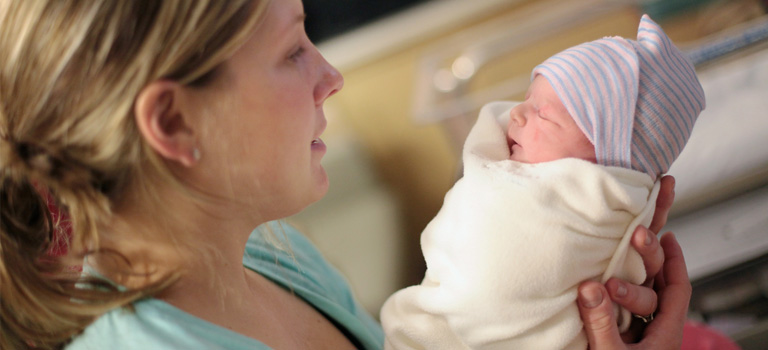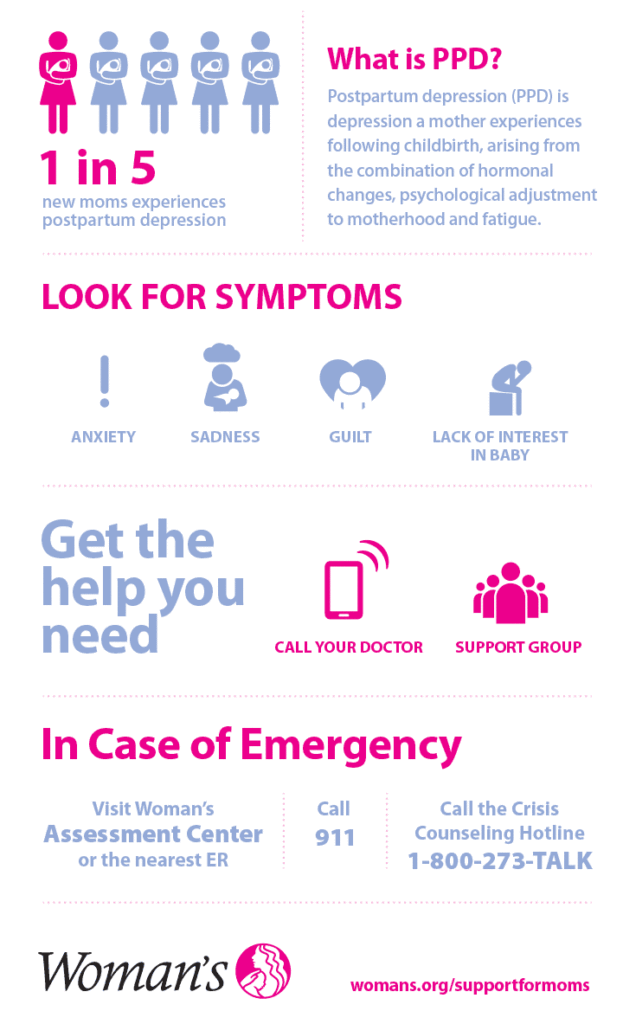A new mother’s body and mind go through many changes during pregnancy and after baby (postpartum). Having a baby can be one of the happiest times in one’s life, but during pregnancy and postpartum many women may suffer from a medical condition called postpartum depression.
1 in 5
One in five new mothers experiences postpartum depression, but unfortunately not all seek help or even know what type of treatment and support is available. Psychological and emotional suffering after a baby can cause new mothers to feel ashamed and guilty about not feeling happy. During Maternal Mental Health Awareness Week, Woman’s Hospital is highlighting those resources available to new mothers who may need support coping with emotions following childbirth, including access to doctors, therapists and social workers trained in caring for pregnant and postpartum patients.
You Are Not Alone
We want you to know postpartum depression is treatable and you are not alone. The postpartum period is designed to happen within a family and social network, and COVID-19 has interrupted this design adding stress to new moms. While new moms are dealing with the challenging emotions that can surround childbirth and caring for a newborn, the COVID-19 pandemic can make these symptoms even worse for some, explains Jacqueline Woods, LCSW, social worker for Woman’s Hospital. “Not only are new moms having to adjust to life with a baby, but they’re having to worry about their family’s health at an even greater degree, and some are taking care of older children that would have been in school. It’s a lot to handle as a new mom.”
Woods also adds that new moms are limited to who can visit, so they are home alone by themselves longer than is typical. Some may have even been laid off or have a spouse or partner that has lost a job or had pay reduced, so they can be experiencing financial stress as well. All of these can be risk factors for postpartum depression.
Baby Blues is Not Just Sadness
It’s important to recognize that symptoms can start before delivery and can include anxiety and post-traumatic stress, and not just sadness or depression. While an estimated 50-80 percent of women can experience “baby blues,” that cause them to feel weepy, irritable or anxious, these symptoms will usually resolve themselves within two weeks and do not significantly interfere a mother’s ability to care for herself and baby. In 10-15 percent of women, these symptoms continue beyond two weeks and/or affect daily activities, and the mother may be suffering from postpartum depression.
Postpartum depression may start as early as the second or third day after delivery or take several weeks to a year to develop. It may also develop during weaning from breastfeeding. Common symptoms include:
- Feeling sad, angry, irritable
- Lack of interest in the baby
- Crying often
- Feeling guilty, ashamed or hopeless
- Unable to sleep or sleeping too much
- Loss of appetite
- Anxiety, worry, stress
- Withdrawing from activities you normally enjoy
- Panic anxiety
- Scary thoughts about yourself and/or the baby
Feelings associated with postpartum depression can cause difficulty relating to baby, family and friends when what a new mom needs most is support and connection. If a mother tells a loved one, family or friend she feels awful, tired, sad, hurt, ashamed or anxious, validate her feelings ask what she needs and if she would like professional help. For those with loved ones who are new mothers, simply letting them know you are available and asking how you can help them may be the first step on the road to recovery.
Women experiencing symptoms of postpartum depression are encouraged to speak with their doctor about treatment options which may include medication, counseling, support and scheduling sleep. Connecting with other women who are in similar situations can also be healing. Mother to mother support is good for mental health!
Woman’s Hospital support groups are currently meeting virtually due to COVID-19.
Anyone interested in attending any virtual support groups can call Social Services at 225-924-8456 for more information. Postpartum Support International (PSI) offers a Helpline (1-800-944-4773) for mothers in distress and can assist in accessing care by professionals specializing in the treatment of postpartum depression in your community. PSI also offers online support groups in both English and Spanish which can be accessed at postpartum.net under Help for Moms.
If a mother needs emergency care or does not feel safe, she is encouraged to immediately let a family member or friend know how she is feeling so she can get immediate help.
For emergency care that cannot wait for a return call from her doctor:
- Call 911
- Visit the Woman’s Hospital Assessment Center or nearest emergency room
- Call the Crisis Counseling Hotline at 1-800-273-TALK
Women can also dial 2-1-1 for help finding additional resources in their area including food pantries, utility assistance, and mental health care.
For more information on how Woman’s can help you or a loved one in need of postpartum support, visit womans.org/supportformoms.


